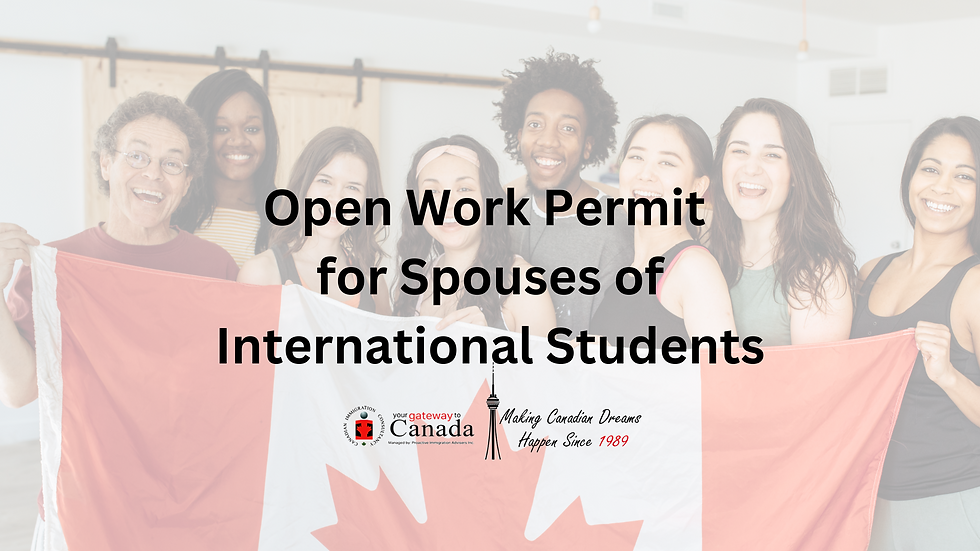How Your Spouse Can Qualify for an Open Work Permit If you are an International Student and not studying a Master's or PhD
- Feb 21, 2025
- 2 min read

Starting January 21, 2025, a significant new benefit is available for the spouses and common-law partners of international students in Canada. If you are currently enrolled in an eligible program of study, your spouse or common-law partner may qualify for an open work permit. This new regulation makes it easier for families to stay together during the student's academic journey while also allowing the spouse to work and support the household.
Who Is Eligible for the Open Work Permit?
To be eligible for this open work permit, your spouse or common-law partner must meet certain conditions, tied to the program of study you are enrolled in. Here are the specific situations where your spouse or common-law partner may qualify for an open work permit:
Master’s Degree Program (16 months or longer) If you are studying in a master's degree program that lasts at least 16 months, your spouse or partner can apply for an open work permit.
Doctoral Degree Program For students enrolled in a doctoral (Ph.D.) program, the spouse or common-law partner may also be eligible.
Eligible Programs If you're participating in certain eligible programs, the spouse may be able to apply for an open work permit. This includes a range of programs that meet the qualifications outlined by Canadian immigration authorities.
Professional Degree Programs Spouses of students enrolled in specific professional degree programs at Canadian universities are eligible for the open work permit. These programs include:
Doctor of Dental Surgery (DDS, DMD)
Bachelor of Law or Juris Doctor (LLB, JD, BCL)
Doctor of Medicine (MD)
Doctor of Optometry (OD)
Pharmacy (PharmD, BS, BSc, BPharm)
Doctor of Veterinary Medicine (DVM)
Bachelor of Science in Nursing (BScN, BSN)
Bachelor of Nursing Science (BNSc)
Bachelor of Nursing (BN)
Bachelor of Education (BEd)
Bachelor of Engineering (BEng, BE, BASc)
These professional programs represent some of the most in-demand fields of study in Canada, and this policy helps ensure that the families of students in these programs can thrive and contribute to the Canadian economy.
Conclusion
This new initiative is a welcome change for many international students who are looking to bring their families along on their academic journey in Canada. With this open work permit, your spouse or common-law partner can work in Canada, contributing to the household and gaining valuable experience in the Canadian labor market. It is a positive step towards enhancing the Canadian experience for international students and their families, giving them the freedom to grow and succeed together during their time in Canada.
You do not need to study a Master's level of PhD program in order for your spouse to qualify for an Open Work Permit. Take any of the following programs as an alternative:
Doctor of Dental Surgery (DDS, DMD)
Bachelor of Law or Juris Doctor (LLB, JD, BCL)
Doctor of Medicine (MD)
Doctor of Optometry (OD)
Pharmacy (PharmD, BS, BSc, BPharm)
Doctor of Veterinary Medicine (DVM)
Bachelor of Science in Nursing (BScN, BSN)
Bachelor of Nursing Science (BNSc)
Bachelor of Nursing (BN)
Bachelor of Education (BEd)
Bachelor of Engineering (BEng, BE, BASc)
Do you need help in getting a Letter of Acceptance and Provincial Attestation Letter? We offer free admission assistance.








Comments